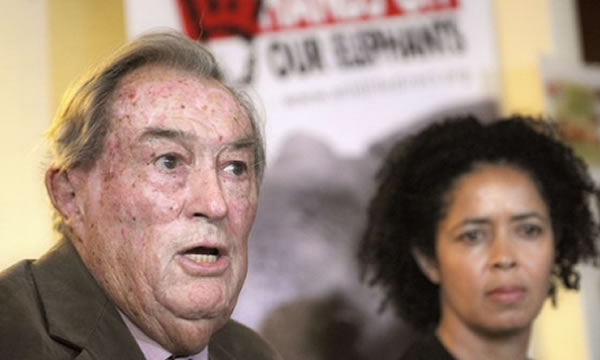
Monday, March 24, 2014
Richard Leakey, founder of the Kenyan Wildlife Service, has called on President Kenyatta to declare a national emergency and take personal charge of the war on poaching

Richard Leakey and Paula Kahumbu at the press conference organised by Wildlife Direct on March 19, 2014 in Nairobi. Photograph: Tony Karumba/AFP/Getty Images
Nairobi 19th March: Four days ago I was in the bush, heartbroken, by the mutilated body of a rhino gunned down by poachers. Now I am in the Serena Hotel in Nairobi at a crowded press conference called by Wildlife Direct, the organisation I work for.
In a strongly worded statement, Wildlife Direct's founder and chairman Richard Leakey calls on Kenya's president Uhuru Kenyatta to take decisive action in the war against the poachers.
The current situation is dire. Poachers are killing rhinos and elephants with impunity, even in heavily fortified private conservancies that were thought to be impregnable. Despite tough new laws, smugglers and poachers caught red-handed are still walking free from Kenyan courts.
Our press release argues that poaching and smuggling are controlled by international crime rings that pose a major threat to the economy and national security. Reports in Kenyan media reflect the sense of hopelessness that many feel in the face of this powerful enemy.
However, though critical, the situation is not hopeless.
As head of the Kenyan Wildlife Service (KWS) in the 1980s, Richard Leakey is credited with having turned around the war on poaching in a matter of months at the time of the last major crisis. With the right leadership, he is convinced it can be done again.
NTV Kenya news report of Wildlife Direct press conference, Nairobi March 19th, 2014
The story of piracy off the coast of Somalia shows how crises like these can be overcome. Piracy and poaching are similar in many ways. In both cases, the scene of the crime is sub-Saharan Africa. Both were long-standing problems that suddenly became major crises and threatened to spiral out of control. In both cases, poor people using primitive technology were able to inflict massive damage that threatened global interests.
The major difference is that piracy directly threatens western commercial interests. In response world leaders have acted decisively - and effectively. After 46 hijackings off the coast of Somalia in 2009 and 47 in 2010, there have been none at all since 12 May 2012.
Crucially, money has been no object when it came to taking on the pirates. The current annual cost of anti-piracy security off the coast of Somalia is more than US $ 2.5 billion. This finances two key elements of the anti-piracy strategy: surveillance and protection. Around $1 billion goes on round-the-clock military naval patrols; the rest is spent by ship operators on employing privately contracted armed guards.
Piracy has also been stopped by the simple measure of locking up the criminals. More than 1,100 Somali pirates are currently in jail in 21 countries, many of them in Kenya.
Operations are coordinated by the UN’s Contact Group on Piracy, which includes more than 85 countries as well as international agencies and private sector representatives. If you have never heard of this organisation, that’s because they’re not interested in publicity, just in getting the job done.
Four "C words" sum up how piracy was defeated: Cash - lots of it, a Coherent strategy, Coordination, and Commitment. How far are these four “keys to success” in place in the war on wildlife crime?
Unlike the war on piracy, until now this one has too often seemed to be all about publicity. In the run-up to the London summit on wildlife crime in February, National Geographic commented: “Everybody and his uncle in wildlife conservation is clamouring for a seat at the table."
Hopefully this is about to change. America grabbed the headlines at the London summit in February with the launch of a new National Strategy for Combating Wildlife Trafficking. The strategy makes some big promises about US commitment to tackle all aspects of the crisis. Secretary of State John Kerry affirmed: "We must act now. The Departments of State, Justice, and Interior are leading the President's whole-of-government fight against wildlife trafficking".
There are also signs that western countries and international agencies are now prepared to commit serious money to fight wildlife crime - even though the amounts are still minuscule compared to what is spent on controlling piracy.
For example, the Clinton Global Initiative recently unveiled a three-year $80 million anti-ivory poaching partnership with conservation organisations that will deploy sniffer-dog teams at key ivory transit points in Africa and hire 3,000 rangers to help protect elephants at 50 sites.
These are encouraging signs of more cash, improved coordination, and greater commitment. But what is still missing is a coherent strategy that recognizes and responds to the truth that Richard Leakey spelled out forcefully at our press conference: the traffickers are getting away with it because in many countries authorities are not prepared to take on the small numbers of gang leaders who control the operations.
The best equipped and trained rangers, and the most stringent laws, will remain impotent as long as the gang leaders are at liberty to use threats and bribery to neutralise them.
After the London summit, UK Foreign Secretary William Hague commented: "this is not just about governments, this is about the public understanding that the ivory trade involves the death of elephants on a great scale”. This sounds as if the UK government is trying to evade responsibility.
The truth is, only states have the resources needed to defeat the organised crime networks controlling the $10 billion trade in illegal wildlife products. People across the world already understand the problem and what is at stake. We are waiting for our governments to take decisive action to target the gang leaders, and root out the high-level corruption that allows them to operate with impunity.